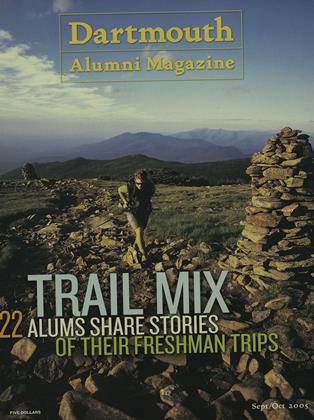TEACHING EXPERIENCE: Following a history department lectureship at Princeton from 1989 to 1990, Brooklyn, New York, native Orleck, 46, joined Dartmouth's history department in the fall of 1990. A former chair of the women's and gender studies department, she is the newly appointed chair of the Jewish studies department.
EDUCATION: B.A. in history and literature, Evergreen College, Olympia Washington; Ph.D. in American and women's history, NYU.
CLAIM TO FAME: Expert on women's political history and social activism, co-editor of The Politics of Motherhood: Activist Voices from Left to Right (University Press of New England, 1997); author of Soviet-Jewish Americans (Greenwood Press, 1999); Common Sense and A LittleFire: Woman and Working-Class Politics inthe U.S. (University of North Carolina Press, 1995); and Storming Caesar'sPalace: How Black Mothers Fought TheirOwn War on Poverty (Beacon Press, August 2005).
THE FEMINIST AND ACTIVIST: Through her work, Orleck attempts to give voice to "people who often get talked about but don't get to speak themselves," she says. Her new book examines federal poverty legislation from FDR to the 1996 Welfare Reform Act, taking as its symbolic center working black mothers fighting for their welfare benefits against the backdrop of conspicuous consumption in Americas "Sin City" of Las Vegas. She approaches social reform "from the bottom up and the top down at the same time," emphasizing that "history looks very different when we change our standard point of view." More generally, Orleck researches race, ethnicity and immigration along with Jewish and gender studies; her course offerings span both departments. She is also an active member of Concerned Women's Faculty, which fights for gender equity On campus, as well as the Women's Faculty Mentoring Network, through which senior professors provide support and counsel for incoming female faculty.
THE TEACHER: Orleck's classroom style is "very interactive." Utilizing small roving groups: to facilitate discussion, she avoids lecture-style didacticism. Favorite course evaluation? "That I managed to make a class of 50 feel like a seminar," she says.
THOUGHTS ON DARTMOUTH: "I love the closeness of the community here and the chance to get to know my students. The informality allowed for faculty is also wonderful—these things are hard to find in bigger institutions," says Orleck. She believes Dartmouth needs to improve its track record with senior women and minority faculty—a group she says the College is better at recruiting than retaining. She also hopes the College will do more to provide affordable housing for faculty, and "a real spouse hiring policy" that would "enable people to relocate with partners and families and prevent them from leaving Dartmouth for urban areas with greater employment opportunities for partners." Overall, however, she is quite satisfied with her Dartmouth experience: "This place has been wonderful for me both personally and professionally," she says.
OFF CAMPUS: Lives in Thetford Center, Vermont; mother of 9-year-old Evi and 6-year-old Raphael; partnered with free-lance journalist Alexis Jetter. Enjoys kayaking, skiing and guitar playing. Although Orleck now prefers acoustic, she played electric in a rock & roll band as an undergraduate. She recently took her daughter to New York City to purchase her first Fender.
 View Full Issue
View Full Issue
More From This Issue
-
 Cover Story
Cover StoryVoices Crying (and Laughing) in the Wilderness
September | October 2005 By BRYANT URSTADT ’91 -
 Feature
FeatureSex, Lies... and a Pulitzer Prize
September | October 2005 By DAVID MCKAY WILSON -
 Feature
FeatureSoviet Union
September | October 2005 By ROBERT SULLIVAN ’75 -
 PERSONAL HISTORY
PERSONAL HISTORYBand of Sisters
September | October 2005 By Maura Kelly ’96 -
 TRIBUTE
TRIBUTENo Quieter Bed
September | October 2005 By James Zug ’91 -
 Interview
InterviewThe Archivist
September | October 2005 By Sue DuBois ’05
Lauren Zeranski '02
-
 Article
ArticleFamily Affairs
Sept/Oct 2004 By Lauren Zeranski '02 -
 Article
ArticleCoping Mechanisims
Nov/Dec 2005 By Lauren Zeranski '02 -
 Article
ArticlePROFILE: Angela Rosenthal
Nov/Dec 2006 By Lauren Zeranski '02 -
 Profile
ProfilePROFILE
Mar/Apr 2008 By Lauren Zeranski '02 -
 Profile
ProfilePROFILE
July/August 2008 By Lauren Zeranski '02 -
 Profile
ProfilePROFILE
Mar/Apr 2009 By Lauren Zeranski '02
Profile
-
 Profile
ProfilePROFILE: Celia Naylor
Jan/Feb 2006 -
 Profile
ProfilePROFILE
May/June 2007 -
 Profile
ProfilePROFILE: Dick Birnie '66
Nov/Dec 2005 By Lauren Zeranski '02 -
 Profile
ProfilePROFILE: Dwight Lahr
Sept/Oct 2006 By Lauren Zeranski '02 -
 Profile
ProfilePROFILE
Mar/Apr 2007 By Lauren Zeranski '02 -
 Profile
ProfilePROFILE
Nov/Dec 2007 By Lauren Zeranski '02

